#I'm with Kaveh on this one
Text
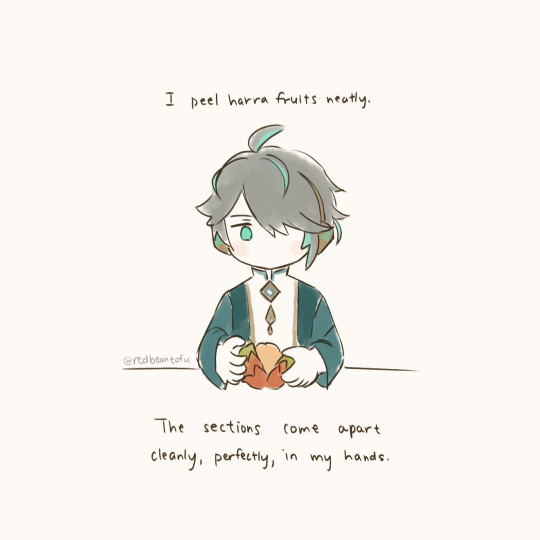
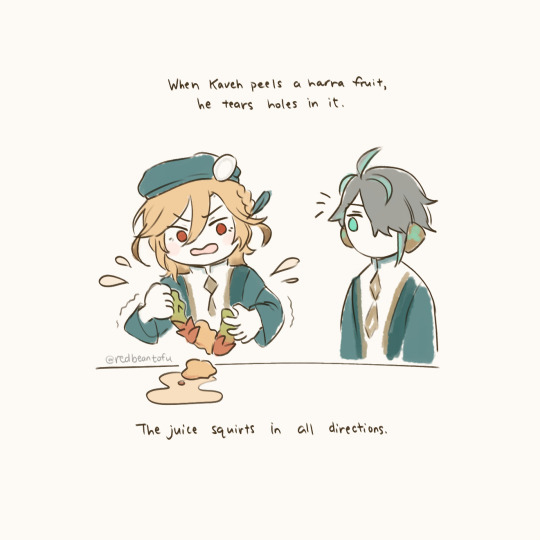
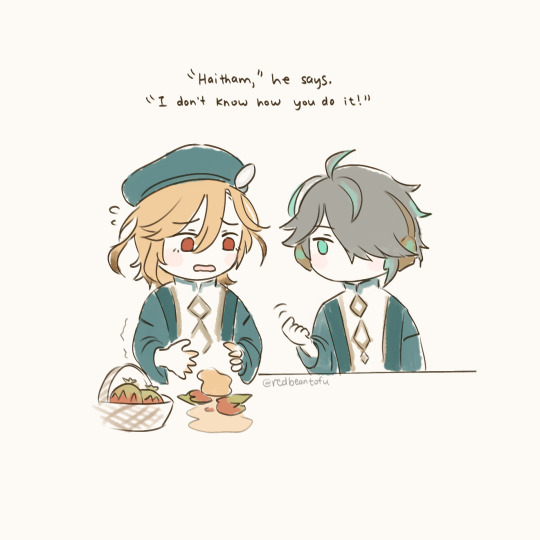
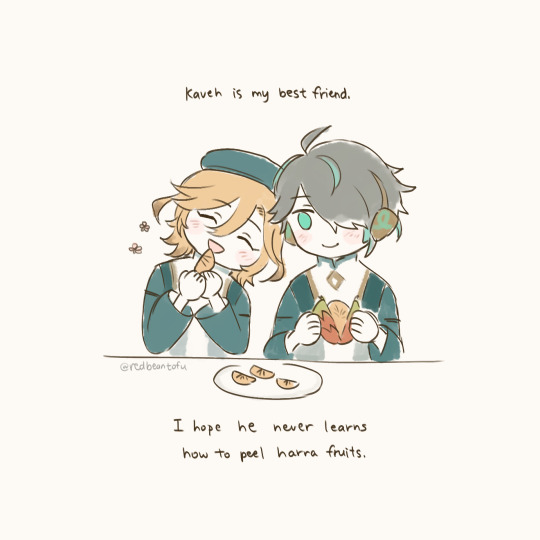
harra fruits.
inspired by a poem i love, ‘oranges’ by jean little
#haikaveh#kavetham#alhaitham#kaveh#genshin impact fanart#genshin impact#haikaveh fanart#queue#this one kinda blew up on twitter and instagram so i'm posting it here too
6K notes
·
View notes
Text
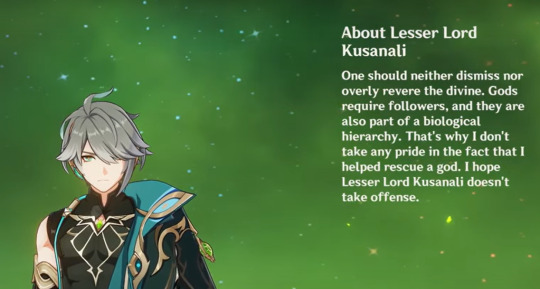
I think Alhaitham's views on gods and his dynamic with Nahida in particular is probably one of the most underrated comedic elements to come out of Sumeru.
This guy put together an entire crack squad and master plan to rescue a god while being the Genshin equivalent of an atheist. "Yes, obviously archons exist. But so do sharks. Both of those beings have their place in the ecosystem, and if I had to pick one to piss off--"
Like, does he believe in the dendro archon? Yes. But is he going to listen if she denies his paid vacation request? Absolutely not.
Bro is selected by name to come discuss important matters with his nation's deity in her sanctuary, and he's just like, "Oh, I ran into Nilou there once. That was cool."
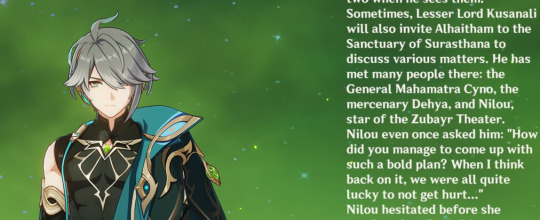
Raised to the highest possible position available in his nation's government by the deliberate selection of his god? Resigns.
We know that Nahida still calls on Alhaitham when Sumeru is in need of defending from nefarious parties, and sends him out with Wanderer to kick ass and take names. Now that they've forgotten Rukkhadevata and the Akademiya's ploy to imprison Nahida has been foiled, most of the people of Sumeru would be floored by the honor of being called upon personally to aid the great dendro archon. Staggered by the fact that the lord of wisdom herself finds them worthy! But Alhaitham? He just goes home. Kaveh asks him what he was up to all day. "Hm. Nothing of note."
Everyone else, upon receiving the recognition of a god: My life has been changed forever. I will be telling my great grandchildren of the day I received such a blessing!
But for Alhaitham? It was Tuesday.
Criminally underrated comedic potential. CRIMINAL.
#genshin impact#alhaitham#nahida#someone please write me a fic#where the entire plot is just Alhaitham having to come up with more and more absurd ways#to dodge the special projects Nahida keeps trying to get him involved in#his normal tactic of just walking away isn't working#SHE'S IN HIS DREAMS#this is NO BUENO#and actually#if you ascribe to the Alhaitham-Deshret connection#it just gets EVEN FUNNIER#like the last time Deshret was friends with the dendro archon it just ended so fabulously didn't it??#Alhaitham: *takes one look at a god trying to befriend him*#“Nope. Nope. We're not doing that again.”#“I'm going to STAY IN MY LANE.”#“You don't see me. I'm not here. Kaveh tell her I'm dead.”
474 notes
·
View notes
Text

Me trying my best to recover after "writing on the wall" by drawing a happy kaveh and fluff
#that one animation of kaveh driving a nail into a doll of himself#i'm still haunted by it#like at this point pls LET ME HUG KAVEH HE NEEDS A HUG#haikaveh#kaveh#alhaitham x kaveh
2K notes
·
View notes
Text





ᯓᡣ𐭩 hexagon complete !
#they're the only ones that are winning#sob... i miss them sm#sumeru love hexagon#also happy birthday kaveh may you finally find closure this year u_u#kaveh#wanderer#alhaitham#cyno#tighnari#genshin impact#and no i'm not dead and i've recovered thanks to everyone's well wishes<3
336 notes
·
View notes
Text
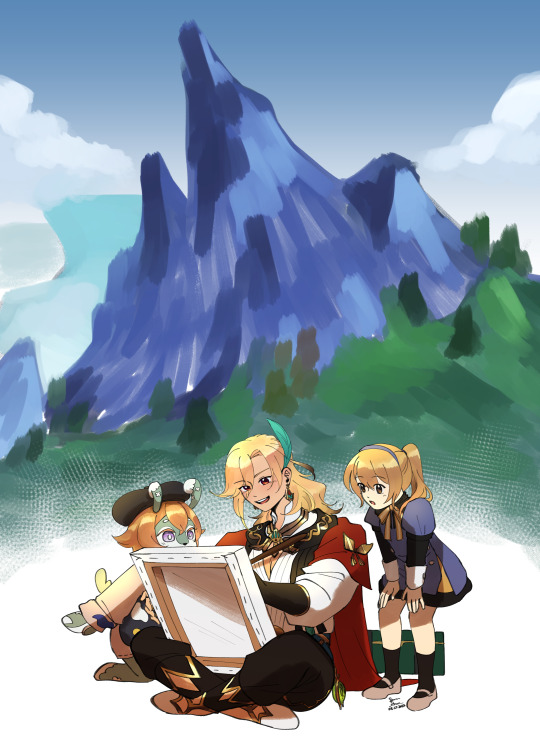
i just think they would be good friends
bonus:
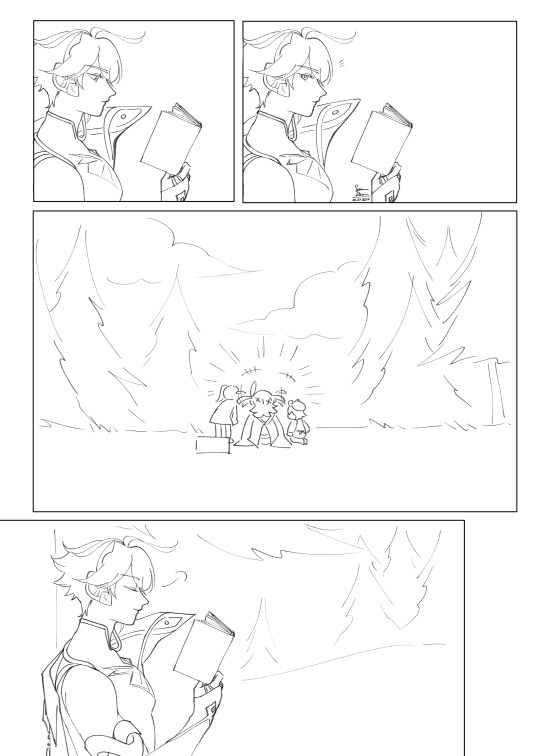
open for better quality | no reposts
#kaveh#mamere#salsa#alhaitham#genshin impact#genshin#fanart#myart#doodle#comic#in my head they all met bc i'm running around fontaine w/ kaveh and alhaitham on my team#kvthm are on a little vacation swimming and exploring the ruins and visiting the opera house <3#as for world quests i loved mamere's and the dialogue at the end of that one really got me#i've been focused on quest progression so only now am i doing exploration#i've been taking pictures of kaveh near the easels hehe#well. i've been taking many pictures in general bc fontaine is very pretty#i think this took me 2 or 3 days total to complete whew
955 notes
·
View notes
Photo
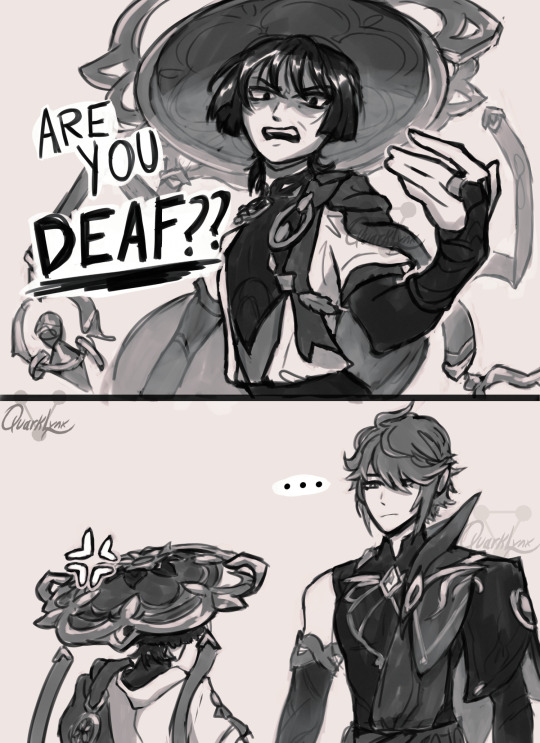

remember the headcanon that Alhaitham was wearing hearing aids? we should bring that back i think
Bonus:

✨reblog to help ur local artist✨
Alt text under the cut
A short comic, all drawn with a loose style in a warmly tinted grayscale.
The first panel depicts Scaramouche from Genshin Impact, he is dressed in the attire he wears as the playable Wanderer character and is angrily gesticulating towards the viewer and looking down at them scornfully. He says, in all capital letters, "are you deaf??". The second panel is a view from behind the Wanderer, showing the viewer that he was yelling at the Genshin Impact character Alhaitham. Alhaitham is significantly taller than the wanderer, even with his hat, and has a neutral expression and stance. The Wanderer has an anime style anger mark above his head, and Alhaitham has a speech bubble that only contains ellipses.
In the first panel of the second image, the Wanderer and Alhaitham still face one another in the same poses, except for Alhaitham's right hand. His hand is moving in the American Sign Language sign for "yes", which is also plainly written out for the viewer in text. The wanderer's anger symbol is no longer present. The middle panel is a simplified silhouette of both characters facing one another, their profiles visible to the viewer. A large ellipses hovers above their heads. The final panel shows the Wanderer turning away from Alhaitham, tugging down his wide-brimmed hat from the front to cover his face. All that can be seen of his expression is a small smile and a bead of sweat. The Wanderer has a speech bubble, which says in lower case lettering: "ah. my mistake". Alhaitham is standing behind the Wanderer, his expression still mostly neutral as he watches the wanderer turn to leave, but he has lines below his eyes that show irritation. His arms are now crossed, and his left hand is holding a book open under the opposite arm.
The bonus image is a grayscale sketch of Lumine and Kaveh from Genshin Impact. To the left, Lumine looks frustrated, with her shoulders drawn up and her left hand pressed to her face while the other rests on her hip. The hand on her face is dragging the lower eyelid on her left eye down. Kaveh is slightly hunched over towards Lumine, and he is laughing so hard he's crying and spitting through pursed lips. He's holding his sides with opposite hands tightly, and looking towards Lumine.
#lynxinks#genshin impact#genshin fanart#genshin wanderer#scaramouche#alhaitham#al haitham#kaveh#genshin impact lumine#lumine#genshin kaveh#genshin al haitham#cw ableist language#scaramouche is not a good person. and to be clear: he is the butt of the joke for being an asshole#he canonically said that in one of the old events. i just took a little creative liberty#Alhaitham is using ASL bc that's what i'm familiar with#added alt text under the cut bc it was too long for the actual alt text function
2K notes
·
View notes
Text
masterpost pt 4 of alhaitham being endeared by kaveh, the second-hand embarrassment is pungent
- alhaitham's story quest
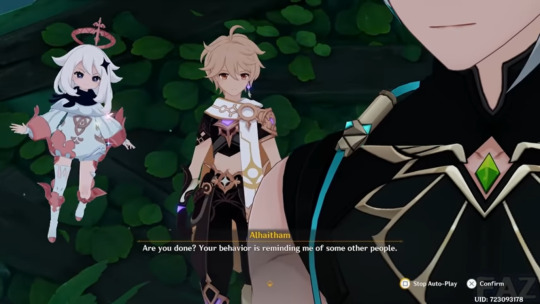
congratulations! you managed to make it to the end of your own story quest before indirectly mentioning kaveh! the close up of his smile when doing so is horrendous
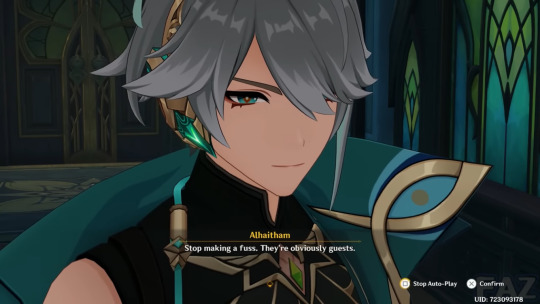
the fond expression whilst feigning annoyance, the contrast between this expression and the ruminative ones he dons during this quest needs to be studied, these pixels fascinate me - also this part of the quest serves as the divide between alhaitham's professional life and the personal, us being in his house, and kaveh being home... i wonder if this is trying to tell us something (and then the ending dialogue before alhaitham kicks the player out implicitly confirming that kaveh is one of alhaitham's priorities through framing...)
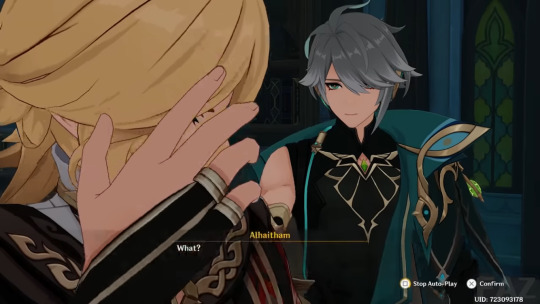
the Infamous expression, this is criminal, i've watched the transition of his expressions here and yeah this is not just because of the angle


he's so amused by their rapport it's sickening
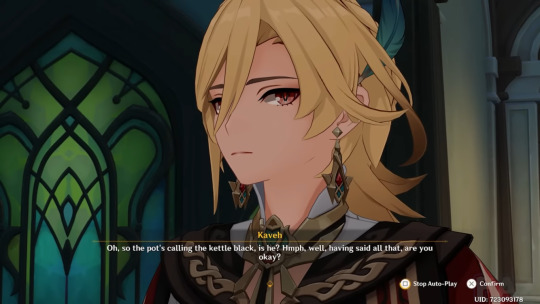
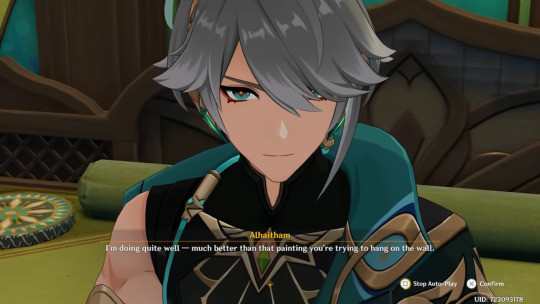
kaveh asking (hesitantly) for the second time if alhaitham really is okay and alhaitham responding that he is fine, and diverts the conversation back to their goading rapport - alhaitham fulfils the initial comment that kaveh made to him upon alhaitham returning, that the painting apparently isn't actually straight. the care they have for each other is apparent although disguised through goading because they cannot be emotionally open with each other
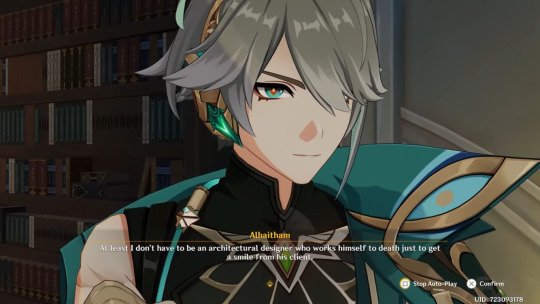
he knows exactly what to say to wheedle kaveh and he's so proud of this fact (i want to compare this teasing rapport to that one instance in a parade of providence, where kaveh loses in drawing lots and alhaitham points out the conflict of interest due to kaveh having a streak of misfortune in his usual goading way, only for kaveh to express genuine dislike for this, which causes alhaitham to startle and back off due to realising the extent of kaveh's upset. it serves to highlight that these typical examples of them 'bickering' are mostly inconsequential, with kaveh initiating the goading or whole-heartedly reciprocating, yes these types of exchanges only serve to reinforce kaveh's image of alhaitham as someone who is critical of him so yeah that isnt good, but that exchange in a parade of providence as compared to this scene in alhaitham's story quest is that there a manageable level they are able to navigate without risking genuine hurt)
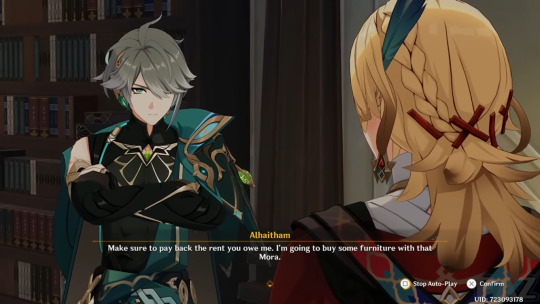
he only said that so kaveh would call him out for said furniture, he is petty and proud and endeared - that being said, we deserve a boring 'ugly' wood carving reveal. also am obsessed with the og chinese where instead of kaveh saying 'don't go off buying furniture without me' he states that alhaitham does not have 'permission' to do so without him (which then probably parallels the line in a parade of providence where kaveh asks where alhaitham was for dinner and instead of 'i wasn't aware i had to report my whereabouts to you' alhaitham says 'am i to report my whereabouts to you?', just these little nuances that the eng misses)

he's so... fond? of kaveh's antics? right in front of kaveh's face? and kaveh just... assumes that alhaitham is thinking 'terrible' thoughts about outing him as poor and homeless? it just goes to show that kaveh sees a completely different version of alhaitham than is actually true
#it just keeps getting worse#this is the last masterpost as of now#until 4.6 sumeru event#i'm so glad i have well over a month to prepare for seeing this guy on my screen again#and then a masterpost five will be on its way#alhaitham#kaveh#haikaveh#kavetham#also i talked so much about a parade of providence in this because it just explicitly confirms#that kaveh is one of alhaithams priorities#but kaveh cannot see this!!!#it's because he didn't see alhaitham's expression in the third pic#if he saw that all would be revealed
181 notes
·
View notes
Text
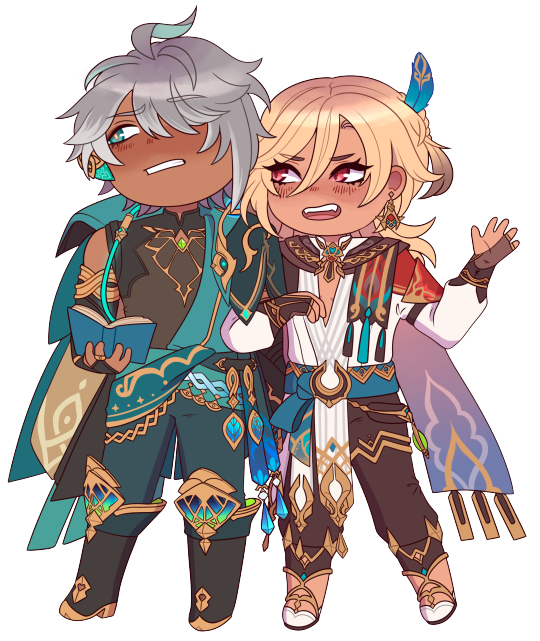
🌱🏛️
#kavetham#haikaveh#genshin impact#genshin impact fanart#kaveh#alhaitham#artists on tumblr#my art#I don't know what their fandom emojis are so this post will remain emojiless until I find out#this one has been the most difficult so far and I'm not 100% satisfied with it#but I will redeem myself the next time I draw them#just a note that if anyone makes any negative comments about the marginal amount that I darkened their skin tones? I will block you.
290 notes
·
View notes
Text
how i feel when i listen to writing on the wall tbh
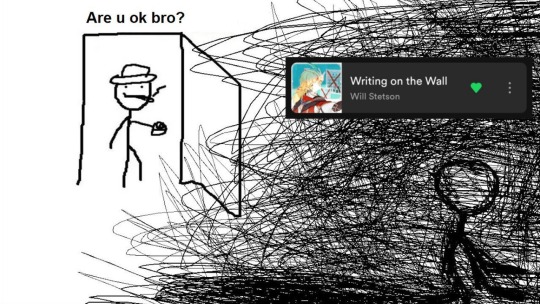
#✧— aphe's musings.#WHY DID HE COOK SO HARD WITH THIS ONE I'M STILL NOT OVER THIS#do not. Make me face my inner turmoil as an artist. i WILL cry. Aside from that this song goes so hard#kaveh#genshin impact#....how do i tag this...?????
43 notes
·
View notes
Text




the Kavetham brainrot is real
#genshin impact#kavetham#haikaveh#kaveh#alhaitham#genshin kaveh#genshin alhaitham#alhaitham genshin#kaveh genshin#genshin impact fanart#my art#digital art#sketch#its not funny how that one scene in cyno's story quest was enough to pull me back into genshin#I'm still trying to get used to drawing them both#I forgot how hard it was to draw genshin character's outfits#visually they are beautiful#but my wrist is gonna fucking DIE
135 notes
·
View notes
Text
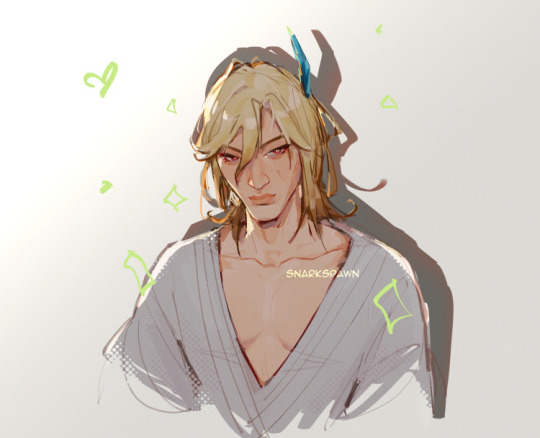
light of kshahrewar ✨
#genshin impact#kaveh#genshin kaveh#genshin fanart#stuff and things#userpharawee#sorry for the absence and lack of. well. anything really#I swear I'm still here it's just#I am once again stuck in capitalist Hell over the summer so my creativity is being drained one customer at a time#and oh my god there are sO MANY CUSTOMERS#it's only been a few weeks and I'm already utterly exhausted lol#but I finally managed to get some doodling in after not drawing for what feels like forever T_T#it's not much and it's not what most of you are here for but it is what it is
98 notes
·
View notes
Text

haikaveh week 2024
day 1: student days
#haikaveh#alhaitham#kaveh#genshin impact#haitham our boy already manifesting his future with senior kaveh hue hue hue#as usual i discovered this last minute on my twitter 'for you' tab lmfao#i'm gonna do myself a favor and not push myself to do every day#if i cannot manage then let this be my one and only submission#i probably should've not added the 'day 1:' in that sense but ehh hahaha#full disclosure in case you don't know already they're currently my otp though i have barely drawn them#literally this is only my second time drawing them... the first time was last year's xmas? i think i posted here too#anyway. drawing and posting and running w/o looking back as usual#png
40 notes
·
View notes
Text

i saw a comment that seeing alhaitham's bare ear feels like seeing a victorian ankle and i haven't stopped thinking about it
#haikaveh#alhaitham#kaveh#genshin impact#i said i'd post all my art from 2019-2023 but it's too overwhelming so i'm just going to post at random lmao#this one's from.. february 2023?#my art
243 notes
·
View notes
Text
I wonder why people turn Kaveh into a tiny guy that needs to tilt his head back to look up at Alhaitham as if he's a head shorter. Or turn him into an overemotional wreck that can't solve anything himself. Or he's portrayed as someone that does one mistake after another, and is more irresponsible than a five year old with scissors. Or is really mean, if not outright cruel to Alhaitham. Or just emotionally oblivious to anyone and his own feelings.
My guy over here is an alumni with honors; he's as tall as Alhaitham (or taller if someone cares); he's loud in volume and emotions, but he very much can be quiet and calm; he's gullible in the sense of trying to help others, but that doesn't mean he cannot be smart; and he's a grown ass man, no matter how babygirl-ified he can be, he took care of himself and his mother as a child, he lived alone as a teenager, and he is capable of living with someone else and actually live, not just survive.
Kaveh is very pretty, and wears his heart on his sleeve, and he's gullible, and has his silly moments. But there is a thin line between that and turning him borderline hyper-feminine, and take away all his smarts, and leave no emotional intelligence. Like, that's a new character, I don't know who that is. And then making him codependent on someone else (who is also mischaracterized to hell and back btw) and take all the nuance he ever had, until it reaches past the point of silly head-canons for AUs, only for it to become a Thing for people.
One of the highlights of his personality is the duality. It's the understanding and the stubborn passion; the friendliness and pettiness on equal measure; the liveliness and regret. He's not an endless crying mess, nor is he an eternal sunshine. He's Kaveh, he has his moments, he has his passions, he has his growth, he has his burdens. Stripping that away from him leaves nothing but a faint impression that could easily be called by another name.
Just. Please. Release Kaveh from the shackles of old yaoi tropes, I'm begging. He deserves so so so much more.
(The thing is, it can be fun dabbling into these mischaracterizations every now and then. We can do deep character studies by amplifying a personality trait, or give/take some at all. We can overexaggerate for a plot, or for artwork. But there is a moment, where these mischaracterizations reach such a widespread chokehold, that it becomes real to people who couldn't care less, and they run with this new version. Suddenly all the canon nuance will be switched out for fanon, any meaning the character had for certain objects or people will be turned on their heads, because no one listens to the source anymore. The silly guy that makes people fall in love with him for him will be replaced by an imitation that will always feel off. It's such a delicate balance of indulgence and preservation of the original, it makes everything complicated. I don't even know if I make any sense anymore.)
#kaveh#apparently i got a lot of feelings about this#sometimes i really think people portray gay characters as hetero-lite#head in hands crying at my desk#a guy is pretty one time...#idk. maybe i'm too old for this. i went through my phase of toxic yaoi when i was 14. i can't anymore#the thing is i'm not even mad. just annoyed to hell and back. a few over-exaggerations every few fics is fine#but the moment it's harder to weed out the canon-interpretation of a character that's when i get tired#sometimes i just wanna read about haikaveh being silly without kaveh bursting into tears/scream/tilt his head to look up at alhaitham
24 notes
·
View notes
Text

revealing the full, text-free version of the cover art for my kavetham fanzine ^^ you can grab a digital copy in my shop!!
open for better quality | no reposts
#kaveh#alhaitham#kavetham#genshin impact#genshin#fanart#myart#doodle#when i tell you i put my entire heart and soul into this#it's actually a combination of the technical skills i've developed recently all in one piece#and i'm really happy w/ how it turned out ^^#i was actually looking through my files for kvthms and i noticed this unfinished sketch#which is rare for me tbh#but it looked clean so i decided to go w/ it and here we are
81 notes
·
View notes
Text
An analysis of Alhaitham's egoism in relation to Kaveh
(Update: The essay this is taken from is now uploaded! It can be accessed here and here as as a pdf <3)
Max Stirner's anarchist egoism is speculated to be the basis of Alhaitham's personal egoism, therefore I will be drawing upon Stirner's 'The Unique and Its Property' for this analysis.
Property and power are key principles within this philosophy. The egoist recognises himself as an individual, separate from the general collective of “humanity”, in which concepts such as freedom and property are governed to and over the people, for then the individual is not considered as such, rather they are a part of “humanity”, rather than a whole individual (Stirner, 170). This thinking is demonstrated within Alhaitham’s Story Quest, where he dismantles Siraj’s Hivemind by targeting individuals that compromised the Hive and reminding them of their own beliefs and preferences – the individual in themselves is a whole, and is not a “part” of a system (Stirner, 170).
In this, the egoist governs himself by what he owns and what he wants to own: “ownness is my whole essence and existence, it is myself. I am free from what I am rid of, owner of what I have in my power, what I control. I am at all times and under every circumstance my own”(Stirner, 106). This relates to the concept of freedom, which, for an egoist exists according to having the power to be free of something, for example, being freed of hunger, thirst, or societal expectations (Stirner, 105). This is reflected within Alhaitham’s description: “He lives free – free from the searching eyes of ordinary people,” but also extends to the power to own.
As power is considered something which the egoist owns, property then becomes something which the egoist exerts power over, and in this, can property be made use of by the egoist – all the while, the property remains an independent vessel (Stirner, 162). This is seen within Alhaitham’s view on his vision, in that it is “no more than a useful tool”, as it can be used to serve his own needs, and that since it in his possession, he has obtained it with his own power, it makes no difference to check on it as he continues to retain that power.
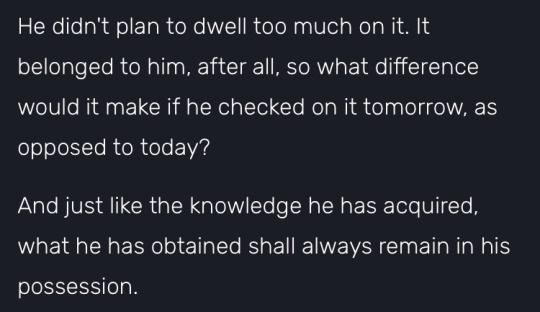
In this sense then, Alhaitham has constructed his life around this form of egoism, in that anything he wants, he has, such as his job as the Scribe, his house, the interests he pursues, the people he enjoys. In order to maintain this way of life, he will deal with, or be rid of, anything he deems as "harmful".

With this, the egoist seeks satisfaction in themselves through the satisfaction of another. Ownership, in relation to another person, can become love, which like all things the egoist has power over, is ultimately theirs – as in their love for a person (Stirner, 187), which is given willingly by the egoist, for loving a person is done for the satisfaction that love brings: “But I love them with the awareness of egoism; I love them because love makes me happy, I love because love is natural to me, it pleases me,” (186).
In loving another comes sacrifice, which the egoist can give into without compromising himself, as he himself sets the “purchase price of [his love]” (187) according to the happiness attributed to the loved one, as in return, the egoist shall also receive happiness (186). To enjoy someone, in an egoist fashion, is to be able to sacrifice all possessions and ownerships without foregoing the sense of an individual, of “ownness”, as the egoist would then lose his objectivity:
“I can deny myself countless things to heighten his pleasure, and I can risk for him what would be dearest to me without him, my life, my welfare, my freedom. Indeed, it forms my pleasure and happiness to feast on his pleasure and happiness. But me, myself I do not sacrifice to him, but rather remain an egoist and—enjoy him. If I sacrifice to him everything I would keep without my love for him, that is very easy… But if I sacrifice others to one passion, I still do not… sacrifice my particular worth, my ownness. Where this nasty incident occurs, love looks no better than any other passion that I blindly obey.” – The Unique and Its Property, 185
It is relevant to note that just as the egoist receives happiness from a loved one’s pleasure, so does an egoist suffer from a loved one’s despair. Just as the egoist would sacrifice something of their own to provide happiness for a loved one in order to exact their own happiness, so too would an egoist sacrifice something, or act, to eradicate the root problem of a loved one’s misery, as this, in turn, would then resolve their own misery:
“If I see the beloved suffering, I suffer with him, and I find no rest until I’ve tried everything to comfort and cheer him…. It doesn’t follow from this that the same thing causes suffering… his tooth gives him pain, but his pain gives me pain. But because I cannot bear the sorrowful crease on the beloved forehead, therefore, then for my sake, I kiss it away. If I didn’t love this person, he could go right on creasing his forehead, that wouldn’t trouble me; I’m only driving away my troubles. – The Unique and Its Property, 186
The phrasing of “driving away… troubles” is particular to note here, due to similar usages of language used within Alhaitham’s Character Stories, in relation to him acting in accordance with his self-governed rules and serving his own self-interest by: “[acting] on his own will and deals with anything that appears harmful in his eyes”.
Kaveh, however, interprets Alhaitham’s egoism as a detached, pragmatic view of humanity, in which the individual isolates themselves not only as a means of prioritisation, but by elevating oneself over others by refusal to intermingle and to cooperate for the benefit of others. Not only is this a harmful opposition to Kaveh’s view of individuals sharing their knowledge and talent in order to pursue a better society, but due to Kaveh’s experience of Alhaitham’s personal egoism, it is harmful to Kaveh personally. Kaveh refuses to prioritise himself over others because he has seen a negative consequence of egoism, in which he has been “cut to the quick” and it has ended one of the few stable relationships in his life.

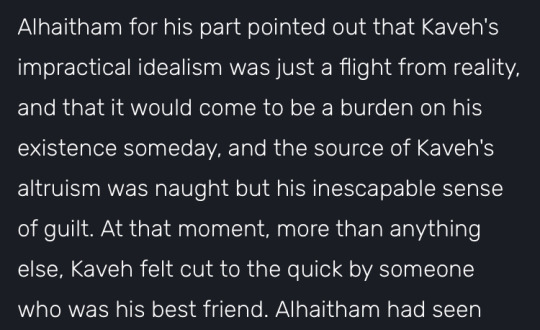
By Kaveh seeing Alhaitham’s comment about his altruism as malicious, Alhaitham has elevated himself over Kaveh, since Alhaitham does not have the same struggles as him, and has trivialised Kaveh’s trauma. To Kaveh, Alhaitham’s prioritisation of the self actively harms others as it desensitises the self to the emotions of others. Therefore, Kaveh opposes the egoism which Alhaitham advocates for, since he interprets it through his own lived experience. Hence, by Alhaitham asserting egoism over Kaveh as a means of Kaveh prioritising himself, it only reinforces Kaveh to strive to consider the feelings of others, as well as to not prioritise his own way of thinking if it undermines someone else’s.
In actuality, Alhaitham’s frustrations with Kaveh lie in his belief that Kaveh’s talents are incongruous with his values, and that if Kaveh were to prioritise himself, he would save himself suffering and enable himself to discover his “true self”, unrestricted by others placing labels onto him.
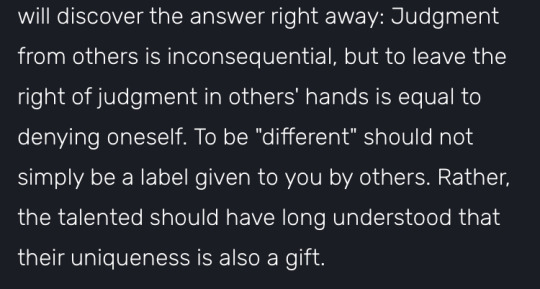
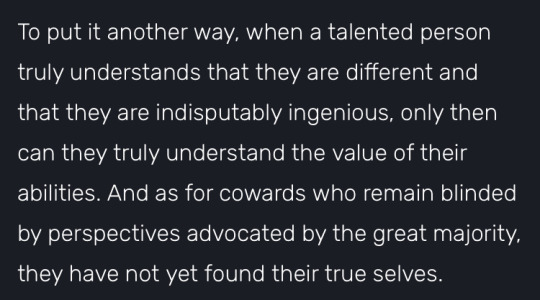
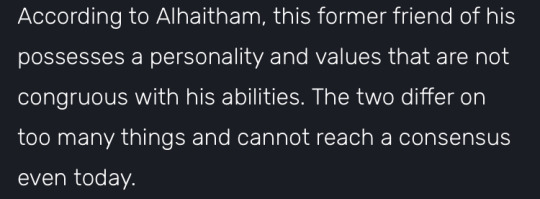

This is a personal frustration which Alhaitham would not compromise himself to assert onto a person he was indifferent to, due to his belief of not getting involved with other’s fates. However, he has been observed to ‘subvert’ his own rules to accommodate Kaveh. Through egoism, it can be seen that rather than ‘subverting’ these rules, Alhaitham adheres to them as an egoist, since he sees Kaveh as his mirror, they offer each other a contrasting perspective he believes they need to have a complete, objective vision of the world.
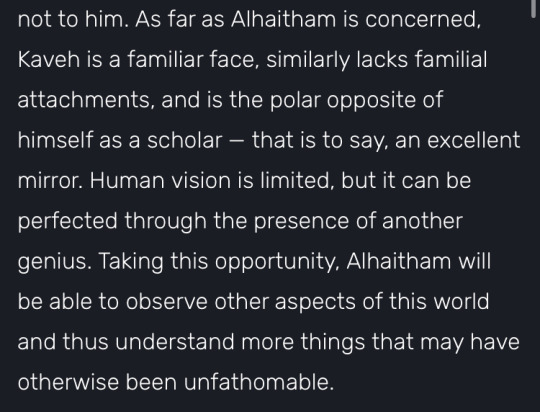
This is necessary for Alhaitham to consider within his own life, and therefore has extended his house to Kaveh, in order to expand his scope of thinking, and to consider perspectives he otherwise would not entertain. Kaveh’s ideals, his beliefs, and his philosophies explicitly interest Alhaitham, in contradiction with Kaveh believing that Alhaitham is disdainful of his perspectives.
In this way, Alhaitham enjoys Kaveh. He willingly pays for some of Kaveh’s tabs; pays for crates of wine for the two of them; and goes out of his way to pursue interactions with Kaveh. Just as Alhaitham is to Kaveh, Kaveh is an old friend, as unchanged in his beliefs as he was in the past and thus is a constant: “the most unshakable part of one's past is a friend that will never change”’.


Alhaitham strives to act in accordance to his own egoism and therefore assesses what “appears harmful” to him, in relation to these rules, so as to be rid of them. This can be extended to Kaveh, as Kaveh falls under what ‘belongs’ to Alhaitham, in the sense that ownership equates to Alhaitham’s enjoyment.
Alhaitham wants to have Kaveh in his life due to the alternate perspective which Kaveh offers him, thus expanding his horizons and granting him knowledge he otherwise would not obtain. As well as this, Kaveh is seen to be considered part of Alhaitham’s way of life that he wants to protect. In line with Stirner’s egoism, it follows that as Alhaitham enjoys Kaveh, as in, ‘owns’ the contentment Kaveh elicits, he therefore is affected by Kaveh’s self-inflicted grievances. Therefore, Alhaitham sees Kaveh’s altruism at the expense of his own wellbeing as something “harmful” to be dealt with, as this not only causes Kaveh inward misery, but also detriments Kaveh finding his “true self” (Alhaitham Character Story 3), which the egoist pursues above all else.
#i realised i hadn't actually discussed their philosophies in a post so here's an snippet from The Essay#kaveh's altruism is brushed over here but i didn't want this post getting too expansive oops#since their differences are the basis of the essay it's hard to filter that down into one post?#basically i'm aware that this reads as incomplete but i promise there is more where this came from!!!#also im reading that line: the two cannot reach a consensus even to this day#and im going insane because isn't that the resolution of their conflict? to find middle ground?#gee i wonder if that line is thematically crucial to their characters#also kaveh reads page 185 of the unique and its property and fights off a blush before denying everything#can they talk. please. im sick of them#the essay is coming along btw!!! thank you for all your thoughts and encouragement!!#haikaveh#alhaitham#kaveh#kavetham#haikaveh meta#genshin meta
133 notes
·
View notes